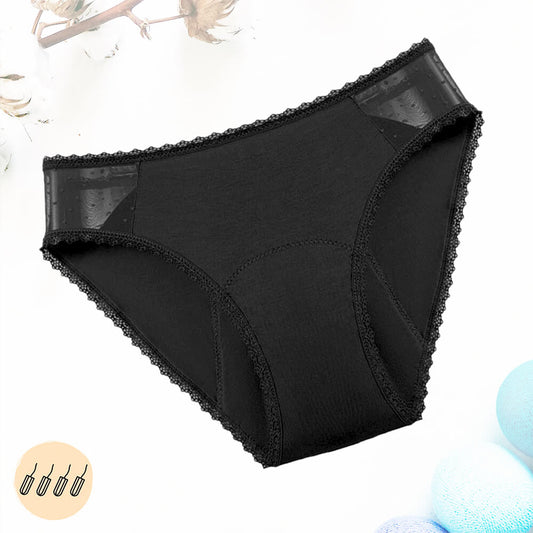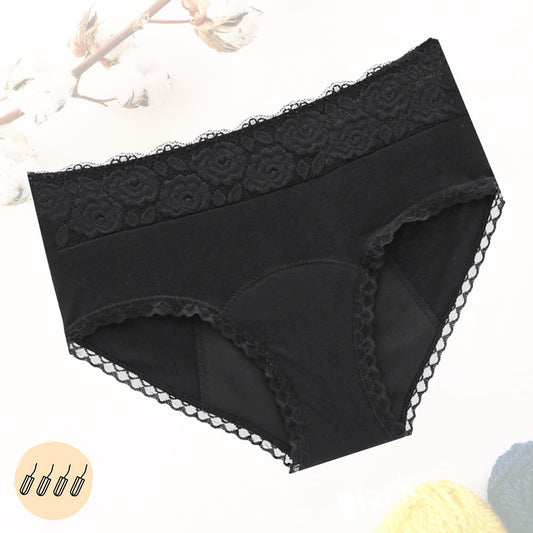
L'hypomenorrhea, also known as light rules or scanty periods, is a condition in which the woman has an extremely weak flow during her period. It's a fairly common period disorder which may also be associated with a decrease in the duration of periods. Among the causes ofhypomenorrhea include heredity, pregnancy, hormonal imbalance or polycystic ovary syndrome. It can also be caused by certain birth control methods, such as pills and intrauterine devices.
What Is Hypomenorrhea?
Every menstrual cycle, for a period that may vary from 21 to 35 days, the uterine lining (endometrium) prepares for the development of the fetus. If the fertilization process does not occur, the body sheds the endometrium during the menstrual cycle, which usually lasts from 4 to 7 days. The duration of the menstrual cycle or the amount of blood flow can vary depending on the activities and lifestyle of each woman.

Your periods can also change over time or due to different circumstances like pregnancy, stress, illness and other factors. Although the frequency, quantity and duration of periods are not the same for all women, it is often abnormal to have scanty periods see very scanty. When the menstrual flow is abnormally reduced during menstruation and the flow duration is shorter, it is calledhypomenorrhea, a type of menstrual disorder quite frequent.
The Most Common Menstrual Disorders
The menstrual disorders are problems related to menstrual cycle normal for a woman. They are one of the most common reasons women visit their gynecologist. There are many types of menstrual disorders, we distinguish in particular:
- La dysmenorrhea refers to painful periods as menstrual cramps during menstruation.
- Le premenstrual syndrome (PMS) refers to the physical and psychological symptoms occurring before the onset of menstruation
- La menorrhagia corresponds to heavy and prolonged bleeding or excessive bleeding during a normal menstrual period.
- La metrorrhagia is bleeding at irregular intervals, especially between scheduled menstrual periods.
- L'amenorrhea is the total absence of rules.
- L'oligomenorrhea corresponds to infrequent rules.
- L'hypomenorrhea refers to scanty periods.
- L'hypermenorrhea refers to very heavy periods.
What Is A Normal Menstrual Flow?
A woman loses on average between 20 to 30 ml of menstrual blood each month. However, this figure can vary greatly from person to person. While a blood loss excess greater than 80 ml is considered to be very heavy periods, in this case we speak ofhypermenorrhea. Conversely, it is observed that a flow less than about 30 ml is generally considered to be scarce.
How To Estimate Your Period Volume?
It is difficult to determine the amount of menstrual fluid that leaves your body with each cycle. However, the best way to know if your periods are weaker and to see if you are using less sanitary napkins or pads, or if you need to change your menstrual cup or your period panties less regularly. If you use a menstrual cup, it often has volume measurements listed on the side to help you estimate the amount of liquid that you lost.

In general, the amount of liquid lost can be estimated when using pads or tampons, depending on the size and maximum quantity liquid absorbed by the disposable periodic protection.
Symptoms of scanty periods
Personalized scanty periods (hypomenorrhea) may have some of the following symptoms:
- Your periods are shorter (duration) than normal
- You change sanitary napkins, tampons or diapers less often. period panties.
- Your flow is not as heavy as usual for the first two days.
- Your bleeding looks like spotting or vaginal discharge.
Sometimes light periods can also lead to reduced symptoms of premenstrual syndrome (PMS), period pain, menstrual cramps, or mood swings.
The main causes of scanty periods
L'hypomenorrhea can occur normally at the extremes of reproductive life, i.e. just after puberty, at the time of the first period and just before the menopause. This is explained by the fact that ovulation is irregular at that time and the lining of the uterus is not developing normally. But normal problems at other times can also cause a insufficient blood flow.
Irregular ovulation due to low hormone levels thyroid, high prolactin, high insulin, high androgen and problems with other hormones can also cause scanty periods. There are several reasons why your periods may suddenly become less heavy. the hormonal level is often responsible for scanty or very scanty periods.
-
Hormonal Contraception

One of the most common reasons for scanty periods is taking a hormonal contraceptive. Indeed, the decrease in menstrual flow is a common side effect of methods of hormonal contraception, such as oral contraceptive pills, intrauterine devices (IUDs) that release hormones, or hormonal implants. The estrogen relatively low content in most hormonal contraceptives reduce endometrial growth, so there is relatively little endometrium left to shed during menstruation. Many women see this side effect as a benefit of using hormonal contraceptives.
-
Age
It is one of the most influential factors the abundance of menstrual flow during menstruation. The amount, as well as the duration of periods, varies between women of different age groups, with a tendency to decrease as menopause approaches.
-
The pregnancy
Although rare, some women suffer fromhypomenorrhea during the first months of pregnancy. It can also be a early sign of pregnancy. When you are pregnant, you are unlikely to have a period. However, some women still continue to have slight bleeding.
-
Breastfeeding
After childbirth, a breastfeeding mother may suffer fromhypomenorrhea because of a high prolactin levels.
-
Weight Gain or Loss

The weight fluctuations can disrupt your menstrual cycle, making your period a lot shorter ou lighter. This is because when you gain weight, the increase in fat content in your body can affect your hormone levels and create a sudden hormonal imbalance. Similarly, losing weight by restricting calories can put stress on your body by decreasing estrogen level. Anorexia and bulimia are also types of eating disorders which can cause irregular and scanty periods.
-
Polycystic Ovary Syndrome (PCOS)
Le polycystic ovary syndrome is a disease in which the ovaries produce a abnormally high amount of androgens, which are male sex hormones. In some women with this syndrome, small fluid-filled sacs or cysts form in the ovaries. Those hormonal changes can prevent a woman from ovulating normally, which can lead to a host of unpleasant symptoms, including acne or oily skin, weight gain and excessive hair growth. Another sign of polycystic ovary syndrome is the irregularity and absence of periods (amenorrhea). When women have their periods, they may be heavier or lighter than average. If you experience these symptoms, talk to your doctor.
-
The stress
You already know that stress can disrupt your body in many ways. When you're stressed, your brain can change your hormonal level. The doing too much exercise can also adversely affect your period due to physical stress imposed on your body. Once these events have passed, your periods should return to normal.
What hygienic protection for scanty periods?
Whatever the intensity of your periods, the period panties are a means of protection durable, reusable and comfortable to have her periods without constraint. Made of soft and breathable fabric, they have a layer of waterproof fabrics to prevent leaks and an absorbent mid-layer to keep you dry. The top layer, soft and ultra-absorbent, wicks away moisture so you feel cool and secure day or night.
Our period panties are available in a range of styles and sizes to suit all menstruating women, whatever your morphology et the intensity of your flow. Oduho period panties contain unique antimicrobial and antibacterial properties, which allow you to go about your day without worrying that your period panties don't let you down.

Personalized scanty periods are not necessarily a sign of a health problem. However, if in doubt, always ask the opinion of a gynecologist or a doctor who will be in a better position to inform you and direct you towards appropriate treatment if necessary.





1 comment
thank you very much for advice